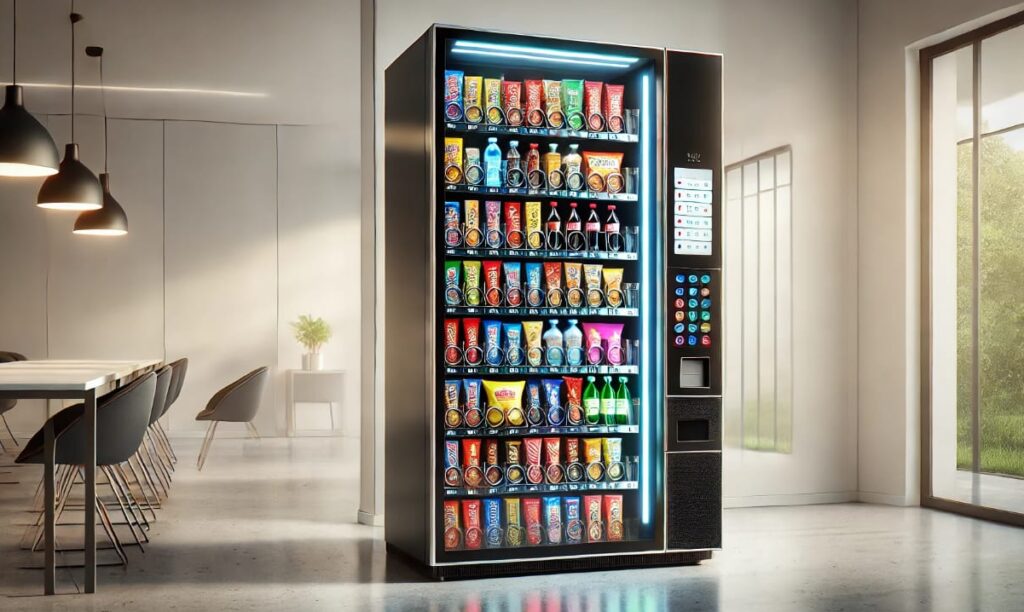
vending machine business
Vending Machine Business,The vending machine business has been a cornerstone of convenience retail for decades. With its low startup costs, scalability, and ability to generate passive income, it’s no surprise that many entrepreneurs are venturing into this industry. Whether you’re looking for a side hustle or aiming to build a full-scale business, understanding the nuances of the vending machine sector is critical to success.
What Is a Vending Machine Business?
A vending machine business involves purchasing or leasing machines to sell products such as snacks, beverages, coffee, fresh foods, or even non-edible items like electronics and personal care products. These machines are strategically placed in high-traffic areas, such as schools, offices, gyms, shopping malls, and transportation hubs, to attract customers and generate sales without the need for direct staff involvement.
Why Start a Vending Machine Business?
The vending machine business offers several advantages:
Low Startup Costs
Compared to other retail businesses, vending machines require a relatively small initial investment.
Scalability
Start with one or two machines and expand as you reinvest profits.
Passive Income
After setup, the business requires minimal day-to-day oversight.
24/7 Operations
Vending machines can operate around the clock, maximizing revenue potential.
Flexibility
The business model allows for a variety of products and locations to fit specific markets.
Steps to Start a Vending Machine Business
Research and Planning
Before diving in, conduct thorough market research. Analyze your target market, understand customer preferences, and evaluate potential locations. Look into the competition and determine what makes your business stand out.
Choose a Niche
Decide what type of products you want to sell. Popular categories include:
Snacks and Drinks
Chips, candies, soda, water, and energy drinks.
Healthy Options
Granola bars, fruit juices, and organic snacks.
Specialty Items
Coffee, sandwiches, and hot meals.
Non-Food Items
Beauty products, phone chargers, or even small electronics.
Find Suitable Locations
The success of a vending machine business often hinges on location. Look for high-traffic areas such as:
Office buildings
Schools and universities
Gyms and fitness centers
Hospitals
Airports and train stations
Purchase or Lease Machines
Choose between buying or leasing machines based on your budget. There are several types of vending machines, including:
Traditional Machines
Dispense snacks or drinks.
Smart Machines
Equipped with cashless payment options and real-time inventory tracking.
Combo Machines
Offer a mix of snacks and beverages.
Stock Your Machines
Partner with reliable suppliers to stock your machines with popular and profitable items. Keep an eye on trends to adapt your inventory to customer preferences.
Secure Licenses and Permits
Check local regulations to ensure compliance. You may need permits for business operations and food safety.
Install and Monitor Machines
Place your machines in strategic locations and ensure they are well-maintained. Use technology to monitor inventory levels and track sales remotely.
Costs Involved in Starting a Vending Machine Business
Starting costs vary widely depending on factors like machine type and location. Here’s a breakdown:
Machine Costs
$1,500–$10,000 per machine, depending on the type.
Inventory
$500–$1,000 for initial stock.
Permits and Licenses
$100–$500, depending on local requirements.
Location Fees
Some property owners charge a monthly fee or a percentage of sales.
Maintenance and Repairs
Budget for regular upkeep and occasional repairs.
Challenges in the Vending Machine Business
While profitable, this industry comes with its challenges:
Vandalism and Theft
Machines in public spaces may be prone to damage.
Competition
Standing out in a crowded market requires innovation.
Inventory Management
Balancing stock levels to prevent overstocking or shortages.
Machine Maintenance
Regular upkeep is essential to avoid downtime.
Tips for Success
Leverage Technology
Use smart vending machines to accept cashless payments and track sales data.
Focus on Customer Preferences
Regularly update your product offerings based on customer feedback and trends.
Maintain Machines Regularly
Ensure machines are always clean and functioning properly.
Negotiate Strategic Deals Work with location owners to secure prime spots and favorable revenue-sharing agreements.
Expand Gradually
Reinvest profits to add more machines and diversify product offerings.
Future Trends in the Vending Machine Industry
The vending machine industry is evolving with technological advancements and changing consumer preferences:
Cashless Payments
Integration of mobile payments, credit cards, and digital wallets.
AI and IoT
Machines equipped with artificial intelligence to analyze buying patterns and IoT for real-time monitoring.
Sustainability
Eco-friendly machines and packaging to appeal to environmentally conscious consumers.
Customized Experiences
Interactive screens and personalized product recommendations.
Conclusion
The vending machine business offers a lucrative opportunity for entrepreneurs willing to invest time and effort into planning and execution. With proper research, strategic location choices, and regular machine maintenance, you can build a profitable enterprise that delivers convenience to customers and steady income for yourself. As technology continues to innovate the industry, staying ahead of trends will position your business for long-term success.



